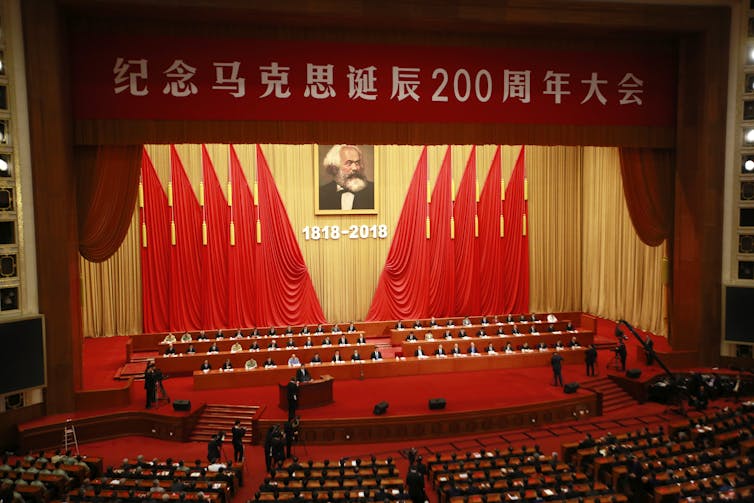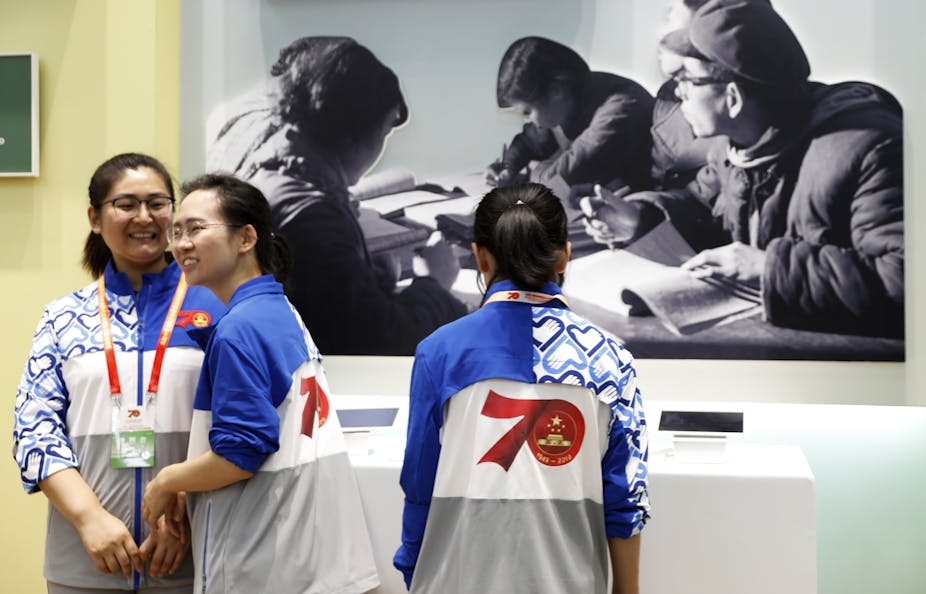In a speech in the summer of 1949, on the eve of the foundation of the People’s Republic of China (PRC), Mao Zedong addressed the question of whether communist China under his leadership would abolish the state.
Political theorists Karl Marx and Friedrich Engels, seminal influences on Mao, had famously claimed the state would “wither away” following a successful revolution. The state was a tool used by capitalist bourgeoisie to suppress the people. Once the revolution had overthrown the bourgeoisie and abolished class inequality, there would be no further need for this instrument of oppression.
Yet, this part of Marxist theory did not resonate with the political events that unfolded in the 20th century. In Russia most notably, far from withering away, the state grew in power and pervasiveness after the revolution of 1917. Would the same occur in China?
In response, Mao insisted in 1949 that he did want to abolish the state, as classical Marxism dictates. Only, it wasn’t possible to do this “just yet”. The state couldn’t be abolished while reaction and class division existed domestically and imperialist powers still threatened China from abroad. State power was necessary in order to rejuvenate China and protect it from imperial aggression.
These two issues – domestic rejuvenation and protection from foreign imperialism – established two core arguments for the continued existence of the state in post-revolutionary China.

A friendly face
Today, as the PRC celebrates its 70th anniversary on October 1, such arguments are still being used by the government of President Xi Jinping. This is especially true at the domestic level. Xi has insisted that if China is to be successfully brought into the much promised “new era”, the state must guide all aspects of Chinese life according to the “truth” of Marxism – from education, to media communication, to fighting corruption.
At the international level, China has attempted to present itself as a more “friendly” and “peace loving” state than it appeared in the days of Mao. In particular, modern China has frequently attempted to highlight its Confucian culture when promoting itself to the world and framed its intentions as seeking the Confucian value of global harmony. The belief being that this Confucian face will appear more friendly to the world, and will raise less concern about the rise of China on the world stage than Marxist anti-imperialist rhetoric would.
That said, anti-imperialism still casts a threatening shadow across this friendly Confucian face.
Battling imperialism
Speaking in 2014 on the 60th anniversary of the “Five Principles of Peaceful Co-existence”, a set of guidelines to govern relations between states outlined in the Panchsheel Treaty between China and India in 1954, Xi carefully framed the idea of harmonious international relations as specifically Asian and post-colonial.
This tradition of Asian harmony, he claimed, played a key role in combating imperialism and ending colonialism. Asian nations would now take the lead, Xi said, in building a new “harmonious” world order which would replace the “law of the jungle” where the “strong bullies the weak”. Such language echoed the struggle against imperialism which became a key component of Marxist theory in the mid-20th century, as revolutionary struggle shifted from Europe to the European colonies.
Anti-imperialist struggle subsequently became a strong vein of Mao’s own Marxist-Leninist theory in China. The prominent attention Xi draws to imperialism appears very much in these traditions: that Asian harmony is the antithesis to imperial aggression.
In international disputes, China is keen to present itself as being on the side of traditional Asian values and frame the interests of its antagonists as the legacy of colonialism. Concerning the Spratly Islands, for example, an archipelago over which China and the Philippines claim sovereignty, China maintains that its claim lies in Asian tradition. The Philippines’ claim by contrast, China argues, rests on an “exaggeration” of the influence of Western colonialists. Interference by the US in the dispute is cast as a continuation of imperialist attempts at exploitation.

Hong Kong protests
Similar anti-imperialist narrative has surfaced clearly in recent months regarding the Hong Kong crisis. The Chinese government and state media continue to portray the protests as being driven by foreign colonial powers seeking to undermine the PRC. Liu Xiaoming, the Chinese ambassador to the UK, twice publicly referred to British politicians as having a “colonial mindset”.
The battle lines between imperialists and Marxists have been clearly drawn in the Hong Kong edition of the China Daily. Protesters waving the British and US flags were described as following symbols not just of imperialism but of “massacres” and “genocide”. This is contrasted sharply with the red flag of the PRC, which stands for “liberation”, an “end to exploitation” and victory in the “revolutionary struggle”.
So while the importance of Marxism for the Chinese state is still clear to see, 70 years on from the founding of the PRC, today, the Chinese Communist Party uses Marxist rhetoric as and when it feels it needs to. In fair weather, China is happy to present a friendly Confucian face to the world. If thwarted or threatened, the PRC is still ready to play Asia’s “red avenger”.

